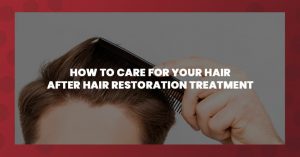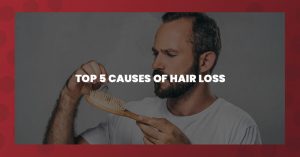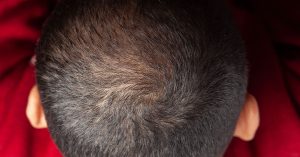Hair loss is stressful and can impact your confidence. Fortunately, the majority of hair loss is entirely optional at this point. Getting treatment, therefore, makes perfect sense.
In order to choose the best hair loss treatment for you, you first need to determine what type of hair loss you’re experiencing. Hair loss has a variety of causes – from genetics to health issues to behavioral factors. Each cause produces a different type of hair loss, some of which are temporary and some permanent.
How Do I Know What Type of Hair Loss I Have?
It’s wise to have your hair loss evaluated by a physician… but understanding the types of hair loss and their underlying causes can give you clues about what is going on in your body and on your scalp.
The Top Five Causes of Hair Loss Are:
• Heredity is the most common cause of hair loss. Androgenic alopecia – also known as male-pattern baldness or female-pattern baldness – is a genetic condition that results in gradual hair loss in specific areas. Men with this condition experience a receding hairline or thinning along the crown of the scalp, which can turn into an M pattern. Meanwhile, women see thinning of the hair on top of their head, most noticeably a widening of the hair’s central part. Hereditary hair loss is considered “progressive”, as there is no preventative treatment that is 100% effective. Fortunately, this type of hair loss is the most common type of hair loss treated by hair restoration physicians… and there are numerous effective treatment options.
• Diseases and medical conditions are common causes of excessive shedding and hair loss. The health of our hair is inextricably linked with the health of our bodies. Pregnancy, thyroid disease, hormonal changes, anemia, autoimmune conditions, vitamin deficiencies, and scalp diseases (like folliculitis) are frequent contributors to hair loss. Even viruses can stress our bodies and affect our hair. In recent years, hair loss after COVID has been a common occurrence… even with mild cases. Sometimes, hair loss from medical issues can be reversed if the underlying disease or condition is resolved.
Medications, medical treatments, and supplements can save our lives and improve our health. Unfortunately, many of them can also damage our hair and scalp. Medications and treatments for conditions like acne, cancer, or depression (and much more) can disrupt the hair growth cycle – causing excess shedding and preventing hair growth. Even helpful nutritional supplements can disrupt the hair’s cycle if taken in large quantities. Hair loss resulting from medication, supplements, and medical treatments may be reversible in some cases.
• Stress is a part of our daily lives and when it isn’t well-managed it can wreak havoc on your hair. It can push large numbers of your follicles into a resting phase, causing hair to fall out several months later (telogen effluvium). Or it can prompt your immune system to attack your hair follicles, resulting in hair loss (alopecia areata). A related condition is trichotillomania – which is the urge to pull hairs from your scalp or other parts of your body – triggered by stress or other psychological issues. Hair loss from stress may be reversible if you address the stressors that are causing it.
• Certain hairstyles can lead to hair loss… especially when you wear your hair tightly pulled back into buns, ponytails, braids, cornrows, or dreadlocks. Traction alopecia occurs when frequent pulling impedes blood flow to hair follicles and causes strands of hair to break or fall out entirely. Hair extensions, weaves, and even wearing rollers for too long can also cause traction alopecia. This type of alopecia may be reversible if you stop wearing these styles and give your hair a rest. If you continue, the constant pulling can damage your hair follicles and permanent hair loss may occur.
How Do I Know If My Hair Loss is Normal?
Daily hair shedding is normal. According to the American Academy of Dermatology, it’s perfectly normal to shed up to a hundred strands of hair per day. If you have long, curly, or dark hair, it may seem like more… but that’s only because they’re more noticeable than short, straight, or light strands. If you are losing more than a hundred strands per day (or if you are developing thinning or balding patches), you should consider discussing the situation with a doctor to determine the underlying cause.
Many types of hair loss can be slowed down or reversed if addressed in a timely fashion. Even if your hair loss turns out to be permanent, there are options available to restore your hairline, and we are here to help.
A Consultation with the Hair Center of Nebraska is Your First Step
If you are experiencing hair loss, contact the Hair Center of Nebraska for a full hair and scalp analysis today. By setting up a consultation, you are taking the first step toward proper hair restoration and beginning a wonderful journey to a better life. Contact us today to set up an appointment.






